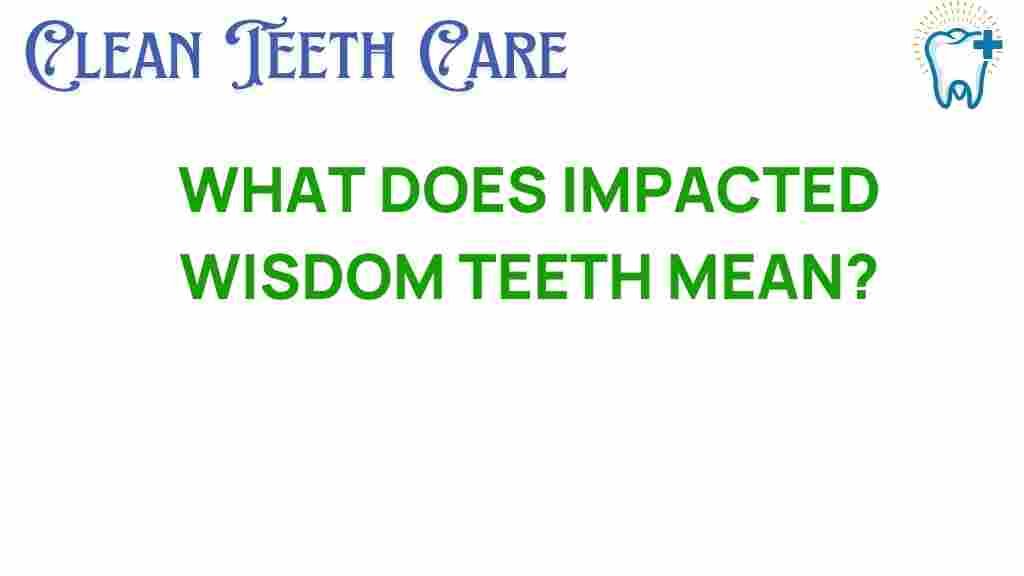Unraveling the Mystery: What Impacted Wisdom Teeth Really Mean
Wisdom teeth, or third molars, are the final set of teeth that typically emerge in late adolescence or early adulthood. While some people have no issues with their wisdom teeth, many experience complications that can lead to impacted wisdom teeth. Understanding what impacted wisdom teeth mean for your dental health is crucial for maintaining good oral hygiene and overall wellness.
What Are Impacted Wisdom Teeth?
Impacted wisdom teeth occur when these molars do not have enough room to emerge properly in the mouth. This can lead to various dental health issues, including:
- Infection
- Cysts
- Damage to neighboring teeth
- Orthodontic problems
Typically, wisdom teeth start to emerge between the ages of 17 and 25. If they are unable to break through the gum line or grow in at an angle, they can become “impacted.” This condition can cause a range of symptoms that may require treatment options, including oral surgery.
Symptoms of Impacted Wisdom Teeth
Recognizing the symptoms of impacted wisdom teeth is key to seeking timely dental care. Common symptoms include:
- Pain or discomfort in the back of the mouth
- Swelling around the jaw
- Red or swollen gums
- Difficulty opening your mouth
- Unpleasant taste in the mouth
- Bad breath
If you experience any of these symptoms, it’s important to consult with your dentist. Ignoring the signs can lead to more serious dental health issues.
Prevention of Impacted Wisdom Teeth
While you cannot always prevent impacted wisdom teeth, there are steps you can take to minimize the risks. Here are some prevention tips:
- Regular dental check-ups: Visiting your dentist regularly can help monitor the development of your wisdom teeth.
- X-rays: Dental X-rays can provide insights into the positioning of your wisdom teeth and help identify potential issues early.
- Maintain good oral hygiene: Brushing and flossing regularly can help keep your mouth healthy and reduce the risk of infections.
Treatment Options for Impacted Wisdom Teeth
Treatment for impacted wisdom teeth usually involves assessing the severity of the issue. Depending on the circumstances, your dentist may recommend one or more of the following treatment options:
1. Monitoring
In some cases, if the impacted wisdom teeth are not causing significant problems, your dentist may recommend a watchful waiting approach. Regular check-ups and X-rays can help track changes over time.
2. Extraction
If the impacted wisdom teeth are causing pain or other dental health issues, extraction may be necessary. This is a common oral surgery procedure that involves:
- Administering anesthesia
- Removing the impacted teeth
- Providing post-operative care instructions
Most patients recover quickly, although some discomfort and swelling are expected after the procedure.
3. Antibiotics
If there is an infection, your dentist may prescribe antibiotics to treat the infection before proceeding with extraction.
Oral Hygiene After Extraction
Proper oral hygiene is crucial for recovery after wisdom teeth extraction. Follow these tips:
- Avoid rinsing your mouth for the first 24 hours to allow blood clots to form.
- Gently brush your teeth, avoiding the extraction site.
- Use saltwater rinses after 24 hours to promote healing.
- Avoid using straws, as sucking can dislodge the blood clot.
Potential Complications of Impacted Wisdom Teeth
Ignoring the symptoms of impacted wisdom teeth can lead to complications such as:
- Pericoronitis: An infection of the gum tissue surrounding the impacted tooth.
- Decay: Impacted teeth can cause cavities in adjacent teeth due to improper cleaning.
- Cysts: Fluid-filled sacs can form around impacted teeth, leading to more extensive surgical procedures.
When to See a Dentist
If you notice any symptoms associated with impacted wisdom teeth, it’s essential to consult a dental professional. Early intervention can prevent more severe complications and ensure your oral health remains intact.
Conclusion
Understanding the implications of impacted wisdom teeth is vital for maintaining your dental health. From symptoms and prevention to treatment options and recovery, being informed equips you to make the best decisions regarding your oral hygiene. Don’t hesitate to seek professional dental advice if you suspect you have impacted wisdom teeth. Timely intervention can save you from unnecessary pain and complications.
For more information on dental health and related topics, check out this external resource. If you have further questions or need to schedule an appointment, contact your dentist today!
For a deeper dive into oral hygiene practices and dental health, visit our dental care blog.
This article is in the category Conditions and created by CleanTeethCare Team
